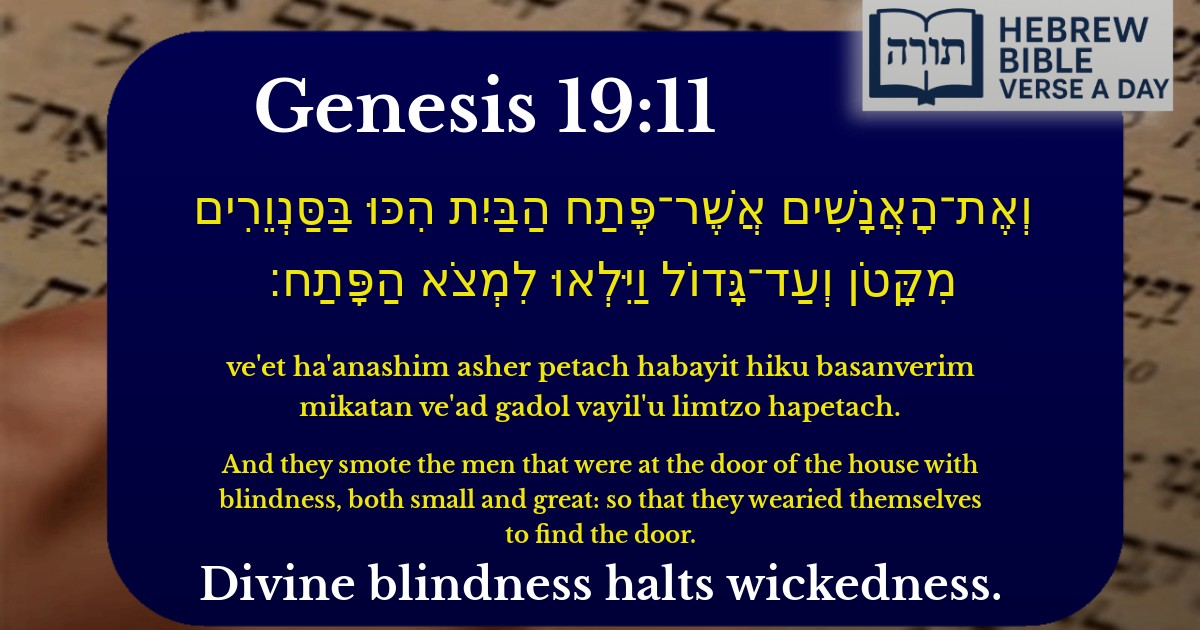Join Our Newsletter To Be Informed When New Videos Are Posted
Join the thousands of fellow Studends who rely on our videos to learn how to read the bible in Hebrew for free!
Hebrew Text
וְאֶת־הָאֲנָשִׁים אֲשֶׁר־פֶּתַח הַבַּיִת הִכּוּ בַּסַּנְוֵרִים מִקָּטֹן וְעַד־גָּדוֹל וַיִּלְאוּ לִמְצֹא הַפָּתַח׃
English Translation
And they smote the men that were at the door of the house with blindness, both small and great: so that they wearied themselves to find the door.
Transliteration
Ve'et ha'anashim asher petach habayit hiku basanverim mikatan ve'ad gadol vayil'u limtzo hapetach.
Hebrew Leining Text
וְֽאֶת־הָאֲנָשִׁ֞ים אֲשֶׁר־פֶּ֣תַח הַבַּ֗יִת הִכּוּ֙ בַּסַּנְוֵרִ֔ים מִקָּטֹ֖ן וְעַד־גָּד֑וֹל וַיִּלְא֖וּ לִמְצֹ֥א הַפָּֽתַח׃
וְֽאֶת־הָאֲנָשִׁ֞ים אֲשֶׁר־פֶּ֣תַח הַבַּ֗יִת הִכּוּ֙ בַּסַּנְוֵרִ֔ים מִקָּטֹ֖ן וְעַד־גָּד֑וֹל וַיִּלְא֖וּ לִמְצֹ֥א הַפָּֽתַח׃
🎵 Listen to leining
Parasha Commentary
📚 Talmud Citations
This verse is not quoted in the Talmud.


Context of the Verse
This verse (Bereshit 19:11) describes the incident in Sodom, where the angels struck the men surrounding Lot's house with blindness (sanverim) to protect Lot and his family. The term sanverim is a unique form of blindness, as explained by Rashi and other commentators.
Rashi's Explanation
Rashi (Bereshit 19:11) explains that sanverim refers to a supernatural blindness that caused confusion and disorientation. The men were not merely physically blinded but were also mentally confounded, leading them to exhaust themselves in futile attempts to find the door. Rashi cites the Talmud (Sanhedrin 89b), which states that this was a miraculous intervention to prevent the mob from harming Lot.
Rambam's Perspective
Rambam (Moreh Nevuchim 2:42) discusses miracles in the context of divine intervention. He explains that this event was a temporary suspension of natural law to fulfill a divine purpose—protecting Lot and demonstrating the severity of Sodom's wickedness.
Midrashic Interpretations
Meaning of "From Small to Great"
The phrase mikaton ve'ad gadol ("from small to great") is interpreted by the Malbim as emphasizing that all levels of society—young and old, leaders and commoners—were equally complicit in Sodom's corruption. This universal participation in evil justified their collective punishment.
Spiritual Lessons
The verse teaches that divine justice intervenes when human wickedness reaches an intolerable level. The blindness serves as a metaphor for the moral and intellectual darkness that accompanies corruption, rendering people incapable of even basic discernment, as seen in their inability to find the door.